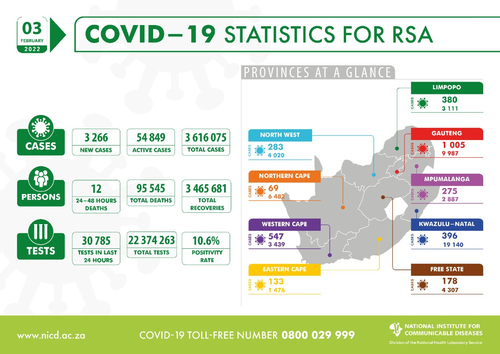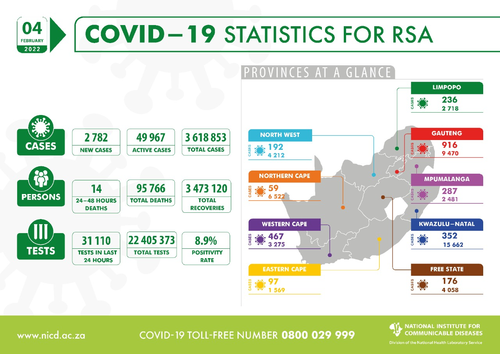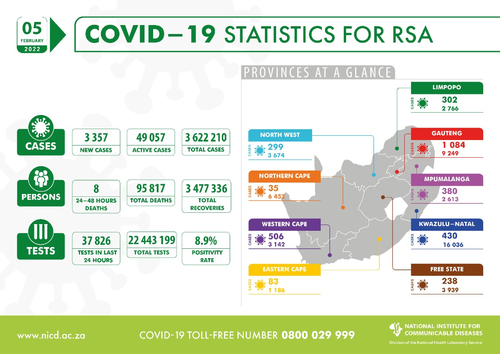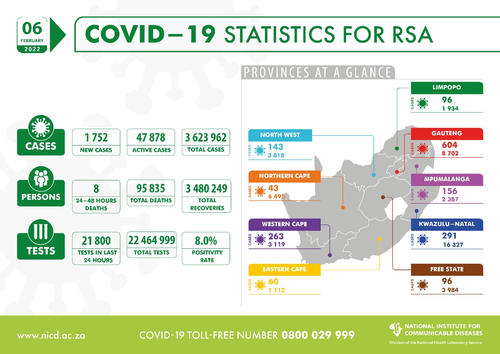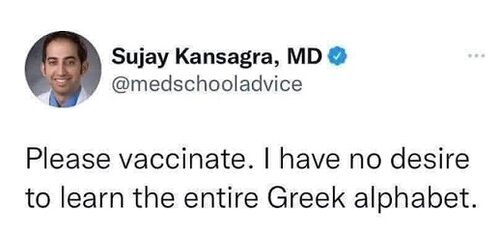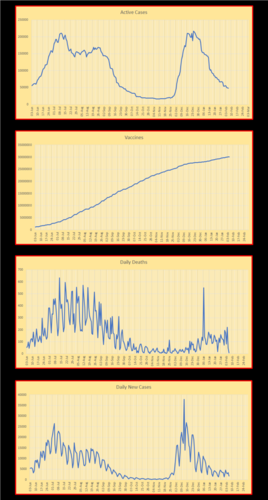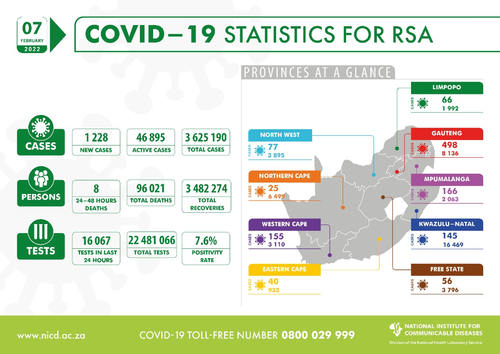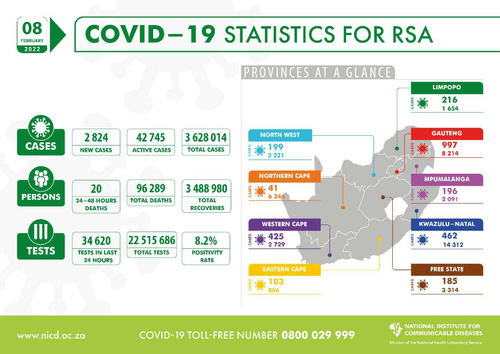I can promise you that Durban is exactly the same. I'm on the road 80% of my day and theres no masks, no social distancing, shops and bars in and around the CBD are full of people and partying flat out.Honestly no one seems to care anymore, masks off a lot of the time, no one enforcing the hand wash etc etc So I imagine the city and informal places are probably more lax.
Navigation
Install the app
How to install the app on iOS
Follow along with the video below to see how to install our site as a web app on your home screen.

Note: this_feature_currently_requires_accessing_site_using_safari
More options
You are using an out of date browser. It may not display this or other websites correctly.
You should upgrade or use an alternative browser.
You should upgrade or use an alternative browser.
Lockdown diaries - COVID-19 matters!
- Thread starter Grand Guru
- Start date
-
- Tags
- lockdown
I can promise you that Durban is exactly the same. I'm on the road 80% of my day and theres no masks, no social distancing, shops and bars in and around the CBD are full of people and partying flat out.
Agreed! ... On my last trip to KZN noted the same ... North Coast residents in particular were very laid back on Covid protocols.
That said, I think most South Africans are simply "gatvol" to greater or lesser degree, and some are simply acting out getting back to (previous) normality as apposed accepting a new normality, and lets face it, our illustrious "leaders" haven't helped with their abuse(s) of power during these times, which has spurned a rebellious spirit .
leaders
you spelt morons wrong
And now this.
My whole family/household is positive, impossible to isolate from them. Yet I'm still fine, must be the nicotine
I’m afraid so.*yawn*
Of course there’s another variant. It’s a virus. There’s always another variant.
Vitamin D could be a piece of Covid-19's 'complex puzzle', Israeli scientists say
https://www.businessinsider.co.za/s...vitamin-d-levels-and-covid-19-severity-2022-2
7 Feb. 2022
A study published Thursday in research journal PLOS One found that about half of people who were vitamin D deficient before getting Covid-19 developed severe illness, compared to less than 10% of people who had sufficient levels of the vitamin in their blood.
We know vitamin D is vital for bone health, but its role in protecting against severe Covid-19 is less-well established.
The latest research was the first to examine vitamin D levels in individuals prior to them contracting Covid-19, the study authors said.
The findings come from 253 people admitted to Galilee Medical Center in Nahariya, Israel between April 7, 2020 and February 4, 2021 – a period before the highly-infectious Omicron variant emerged.
Dror said the findings suggested vitamin D helped bolster the immune system to deal with viruses that attack the respiratory system.
"This is equally relevant for Omicron as it was for previous variants," Dror said.
The research doesn't prove vitamin D protects against Covid-19 and isn't a green light to avoid vaccines and take vitamins instead. Vaccines cut the risk of Omicron hospitalisation, particularly after a booster, by up to 90%, according to the UK Health Security Agency.
Most vitamin D comes from direct sunlight on the skin. It's also found in foods such as fatty fish, mushrooms, and egg yolks as well as supplements.
Vitamin D levels of more than 20 nanograms per millilitre are considered sufficient for most people, according to the US Centers for Disease Control and Prevention – which is the benchmark used by the researchers from Bar-Ilan University and Galilee Medical Center.
Research compiled before the emergence of Covid-19 and published in the Lancet, found vitamin D cut the risk of other respiratory infections, compared with dummy drugs.
But for Covid-19, early findings have been inconsistent – some studies have found a link between low vitamin D levels and severe Covid-19, whilst others concluded the vitamin wasn't protective.
It wasn't clear – even from those studies with results showing a positive correlation between low vitamin D levels and severe Covid-19 – if depleted vitamin D came before or after people got sick, the Israeli researchers said.
Despite the new Israel data, we still don't know if low vitamin D levels cause people with Covid-19 to develop serious disease.
Underlying conditions that reduce vitamin D can also make people more vulnerable to severe Covid-19, for example... "
https://www.businessinsider.co.za/s...vitamin-d-levels-and-covid-19-severity-2022-2
7 Feb. 2022
- Low levels of vitamin D prior to catching Covid-19 were linked to worse illness, a study found.
- Vitamin D helps bolster the immune system to tackle viruses that attack the lungs, researchers said.
A study published Thursday in research journal PLOS One found that about half of people who were vitamin D deficient before getting Covid-19 developed severe illness, compared to less than 10% of people who had sufficient levels of the vitamin in their blood.
We know vitamin D is vital for bone health, but its role in protecting against severe Covid-19 is less-well established.
The latest research was the first to examine vitamin D levels in individuals prior to them contracting Covid-19, the study authors said.
The findings come from 253 people admitted to Galilee Medical Center in Nahariya, Israel between April 7, 2020 and February 4, 2021 – a period before the highly-infectious Omicron variant emerged.
Dror said the findings suggested vitamin D helped bolster the immune system to deal with viruses that attack the respiratory system.
"This is equally relevant for Omicron as it was for previous variants," Dror said.
The research doesn't prove vitamin D protects against Covid-19 and isn't a green light to avoid vaccines and take vitamins instead. Vaccines cut the risk of Omicron hospitalisation, particularly after a booster, by up to 90%, according to the UK Health Security Agency.
Most vitamin D comes from direct sunlight on the skin. It's also found in foods such as fatty fish, mushrooms, and egg yolks as well as supplements.
Vitamin D levels of more than 20 nanograms per millilitre are considered sufficient for most people, according to the US Centers for Disease Control and Prevention – which is the benchmark used by the researchers from Bar-Ilan University and Galilee Medical Center.
Research compiled before the emergence of Covid-19 and published in the Lancet, found vitamin D cut the risk of other respiratory infections, compared with dummy drugs.
But for Covid-19, early findings have been inconsistent – some studies have found a link between low vitamin D levels and severe Covid-19, whilst others concluded the vitamin wasn't protective.
It wasn't clear – even from those studies with results showing a positive correlation between low vitamin D levels and severe Covid-19 – if depleted vitamin D came before or after people got sick, the Israeli researchers said.
Despite the new Israel data, we still don't know if low vitamin D levels cause people with Covid-19 to develop serious disease.
Underlying conditions that reduce vitamin D can also make people more vulnerable to severe Covid-19, for example... "
Vitamin D could be a piece of Covid-19's 'complex puzzle', Israeli scientists say
https://www.businessinsider.co.za/s...vitamin-d-levels-and-covid-19-severity-2022-2
7 Feb. 2022
Israeli scientists said they found "striking" differences in the chances of getting seriously ill from Covid-19 when they compared patients who had sufficient vitamin D levels prior to contracting the disease, with those who didn't.
- Low levels of vitamin D prior to catching Covid-19 were linked to worse illness, a study found.
- Vitamin D helps bolster the immune system to tackle viruses that attack the lungs, researchers said.
A study published Thursday in research journal PLOS One found that about half of people who were vitamin D deficient before getting Covid-19 developed severe illness, compared to less than 10% of people who had sufficient levels of the vitamin in their blood.
We know vitamin D is vital for bone health, but its role in protecting against severe Covid-19 is less-well established.
The latest research was the first to examine vitamin D levels in individuals prior to them contracting Covid-19, the study authors said.
The findings come from 253 people admitted to Galilee Medical Center in Nahariya, Israel between April 7, 2020 and February 4, 2021 – a period before the highly-infectious Omicron variant emerged.
Dror said the findings suggested vitamin D helped bolster the immune system to deal with viruses that attack the respiratory system.
"This is equally relevant for Omicron as it was for previous variants," Dror said.
The research doesn't prove vitamin D protects against Covid-19 and isn't a green light to avoid vaccines and take vitamins instead. Vaccines cut the risk of Omicron hospitalisation, particularly after a booster, by up to 90%, according to the UK Health Security Agency.
Most vitamin D comes from direct sunlight on the skin. It's also found in foods such as fatty fish, mushrooms, and egg yolks as well as supplements.
Vitamin D levels of more than 20 nanograms per millilitre are considered sufficient for most people, according to the US Centers for Disease Control and Prevention – which is the benchmark used by the researchers from Bar-Ilan University and Galilee Medical Center.
Research compiled before the emergence of Covid-19 and published in the Lancet, found vitamin D cut the risk of other respiratory infections, compared with dummy drugs.
But for Covid-19, early findings have been inconsistent – some studies have found a link between low vitamin D levels and severe Covid-19, whilst others concluded the vitamin wasn't protective.
It wasn't clear – even from those studies with results showing a positive correlation between low vitamin D levels and severe Covid-19 – if depleted vitamin D came before or after people got sick, the Israeli researchers said.
Despite the new Israel data, we still don't know if low vitamin D levels cause people with Covid-19 to develop serious disease.
Underlying conditions that reduce vitamin D can also make people more vulnerable to severe Covid-19, for example... "
Could be something to this, as a prophylaxis I upped my Calciferol to 4 a week and when I got Delta I was completely asymptomatic, might just be coincidence though.
Many Drs have been prescribing it since the beginning of the pandemic
Wastewater: Taking surveillance to the next level
https://yourlocalepidemiologist.substack.com/p/wastewater-taking-surveillance-to
WBE worked as a fantastic warning system. In fact, it was one of the first surveillance systems to predict infection uptick in the city of Tshwane (near Omicron’s epicenter in South Africa; see Figure below). Before cases rose, detection of COVID-19 in wastewater was almost as high as it was with Delta. On November 26, we knew this meant one of two things: A rise in cases was coming and coming fast; or, cases were so mild they were going undetected. Time told us it was a combination. But, because of this system, South Africa was able to warn the world of what was to come.
https://yourlocalepidemiologist.substack.com/p/wastewater-taking-surveillance-to
WBE worked as a fantastic warning system. In fact, it was one of the first surveillance systems to predict infection uptick in the city of Tshwane (near Omicron’s epicenter in South Africa; see Figure below). Before cases rose, detection of COVID-19 in wastewater was almost as high as it was with Delta. On November 26, we knew this meant one of two things: A rise in cases was coming and coming fast; or, cases were so mild they were going undetected. Time told us it was a combination. But, because of this system, South Africa was able to warn the world of what was to come.
Similar threads
- Replies
- 0
- Views
- 1K
- Replies
- 1
- Views
- 2K
- Replies
- 0
- Views
- 1K



